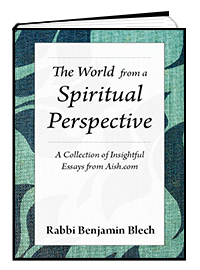

 The World from a Spiritual Perspective: A Collection of Insightful Essays from Aish.com
The World from a Spiritual Perspective: A Collection of Insightful Essays from Aish.com
By Rabbi Benjamin Blech
Over the course of many years writing for Aish.com, Rabbi Blech commented on a wide range of topics – from movies to Bernie Madoff to Tiger Woods to the killing of Osama bin Laden – as well as a host of other major and minor noteworthy events. What connects these essays is nothing less than Judaism. And that’s because for me Judaism means looking at the entire world through the lens of a divinely ordained perspective known as the Torah. Judaism isn’t just a religion that teaches us how to relate to God. It’s a way of life that is meant to make us wiser, more contented and better people. This collection of essays explores how viewing the world from a spiritual perspective can uncover new avenues of understanding and elevate our daily lives.
The Archenemy of Happiness
“I used to think that the main goal of American business was to make people happy. Create new products so consumers have a better quality of life. Add new bells and whistles to existing technologies to offer a more satisfying experience to the users.
I thought happiness was the objective. But the truth is just the opposite: billions of dollars are spent to figure out how to make us feel unhappy. And unless we understand the secret motivation behind the desire of marketers to make us feel discontented with what we have, we are going to fall victim to a never ending cycle of unhappiness.”
—————————————————————————————————————————-
“The Secret” Revealed
“Thinking positively is always the first step to success. Should we ardently wish for things that we want? Of course! Hope fills us with conviction that our dreams are attainable. Desire serves as spur to our initiative. If it is not a magnet, it is at the least a supreme motivator. We should believe in the possibility of acquiring our heart’s desires. But that’s far from saying that there is a universal and unequivocal law that turns every one of our wishes into God’s command.
Judaism always understood that the answer to some of our most profound desires may still be “No.” Not every wish deserves to be granted. And even more to the point, not every wish ought to be fulfilled. George Bernard Shaw understood it when he pointed out that “There are two great tragedies in life. One is not having your prayers answered; the other very often is the reverse.” Jewish prayer asks of God, “And fulfill the requests of our heart for good” – only if what we ask for is truly in our best interest from the Divine perspective.”
 Rabbi Benjamin Blech is an internationally recognized educator, religious leader, author, and lecturer.
Rabbi Blech is the author of twelve highly acclaimed and best selling books, with combined sales of close to half a million copies, including three as part of the highly popular Idiot’s Guide series. His book, Understanding Judaism: The Basics of Deed and Creed, was chosen by the Union of Orthodox Jewish Congregations as “the single best book on Judaism in our generation”. Together with an accompanying six hour video, filmed by the producers of 20/20, featuring Rabbi Blech, it is presently being used as the basis for study groups in numerous synagogues and universities around the country.
Rabbi Benjamin Blech is an internationally recognized educator, religious leader, author, and lecturer.
Rabbi Blech is the author of twelve highly acclaimed and best selling books, with combined sales of close to half a million copies, including three as part of the highly popular Idiot’s Guide series. His book, Understanding Judaism: The Basics of Deed and Creed, was chosen by the Union of Orthodox Jewish Congregations as “the single best book on Judaism in our generation”. Together with an accompanying six hour video, filmed by the producers of 20/20, featuring Rabbi Blech, it is presently being used as the basis for study groups in numerous synagogues and universities around the country.
His book Taking Stock: A Spiritual Guide To Rising Above Life’s Financial Ups and Downs was featured in a full page article in the Sunday New York Times and one of his recent works, If God is Good, Why Is The World So Bad? has been translated into Indonesian where it has had a powerful reception in the wake of the country’s tsunami, as well as into Portuguese.
In a national survey, Rabbi Blech was ranked #16 in a listing of the 50 most influential Jews in America. A recipient of the American Educator of the Year Award, he is a Professor of Talmud at Yeshiva University since 1966 and has formed thousands of student-teacher relationships through his warm and caring style. A tenth-generation rabbi, Rabbi Blech is Rabbi Emeritus of Young Israel of Oceanside, which he served for 37 years. He is a frequent lecturer in Jewish communities as far-flung as Australia, South Africa, New Zealand, Bangkok, Singapore, Hong Kong, Tokyo and Israel. Closer to home, he has served as Scholar-in-Residence at hundreds of synagogues throughout the United States and Canada and been active on behalf of countless Jewish causes. His lectures on tape have an international following and are among the most popular from among the thousands made available on the web through Aish Hatorah. He is known for his ability to present complicated ideas in a clear and entertaining manner. A past President of both the National Council of Young Israel Rabbis, as well as the International League for the Repatriation of Russian Jewry, Rabbi Blech has also served as officer for the New York Board of Rabbis as well as the Rabbinical Council of America. He has appeared on national television (including the Oprah Winfrey Show); hosted a popular weekly radio program in New York; and written for Newsweek, The New York Times and Newsday, in addition to a wide and varied number of scholarly publications. As a result of his personal meeting with the late Pope John Paul II, he was instrumental in securing the loan of precious Jewish manuscripts for exhibition in Israel and he is presently involved in further negotiations for the return of precious Judaica held by the Vatican that may well prove to be of historic significance.
Rabbi Blech is an unusually eloquent and gifted speaker, as well as a profound contemporary theologian and religious spokesman, who has made a major impact on the many tens of thousands of people he has addressed.
AND MOST RECENTLY: Rabbi Blech’s latest book, The Sistine Chapel: Michelangelo’s Forbidden Messages in the Heart of the Vatican, was featured on Nightline, Good Morning America and a one-hour special on 20/20.
Coinciding with the 500th anniversary of Michelangelo’s starting work on the frescoes of the Sistine Chapel, this groundbreaking book is already the subject of huge interest, discussion and controversy. Translated into 15 languages, including Japanese, available in 25 countries, a first printing of 100,000 copies by HarperOne, movie and TV rights presently in negotiation with three major film companies, and national TV coverage, this major work proves that Michelangelo incorporated many teachings of Jewish Midrash and Kabbalah into the Sistine Chapel – daring ideas unknown to its 4 million annual visitors. And unlike the DaVinci Code, this book is not fiction but fact. Enrico Bruschini, official Art Historian of the American Embassy in Rome, in his Foreword to the book writes, “Just as the work of Michelangelo in the Sistine Chapel changed forever the world of art, so will this book change forever the way to view and, above all, to understand the work of Michelangelo!”